Origins of the Names of West African Countries
(作者:电子科技大学西非研究中心团队,执笔人:Enoch Amoah(电子科技大学西非研究中心助理)【西非漫谈】2022年第一期,总第五十期。翻译:宋和,整理:孟雅琪、张海琳,供稿:赵蜀蓉)
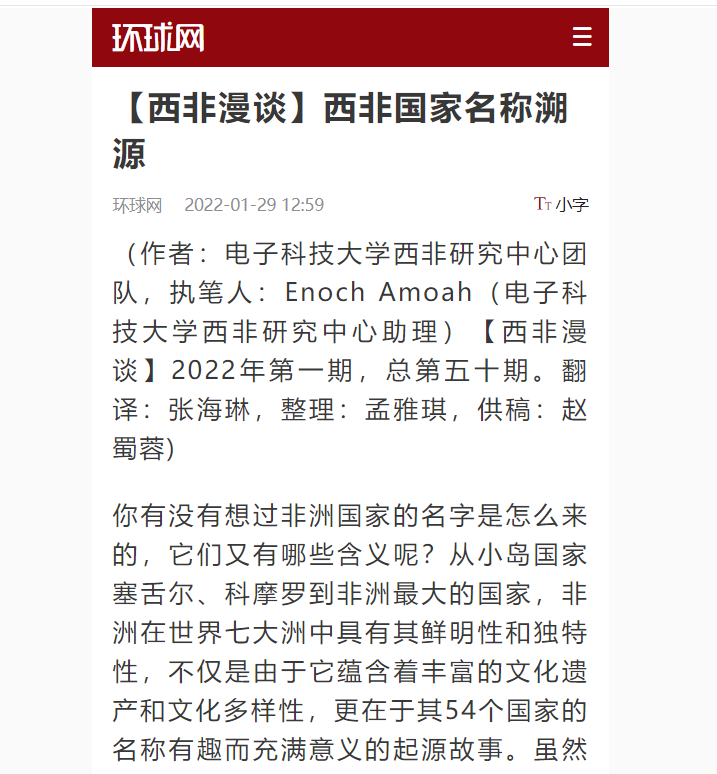
--本文原刊载于环球网(Huanqiu.com)“西非漫谈”栏目
链接:https://opinion.huanqiu.com/article/46b8Bt4FJgI
Have you ever wondered how African countries got their names from and what they mean? From its tiny island nations of Seychelles, Comoros, and Sao Tome and Principe to Algeria, its largest country, Africa is not only distinctively unique among the seven continents of the world for its rich cultural heritage and diversity but more interesting is the meaning and origins of the names of the 54 countries that make up the continent today. While some of these names originated among the people, many could best be described as misnomers, as they are remnants of colonial legacy. Indeed, there is a cause to believe that the name Africa in itself did not originate from within the people themselves. The name might have originated from the Greek word “a-phrike”, meaning ‘without cold’, or ‘without horror’ or the Latin word for sunny or hot, namely “aprica”. According to historians of Africa decent, the ancient name of Africa was probably Alkebulan, which means “mother of mankind” or “garden of Eden.” This name is perhaps unsurprising. After all, Africa is the oldest inhabited continent on Earth. Thus, focusing on West Africa, this article accounts for how the 16 countries in the sub-region received their names and the meanings of these names.
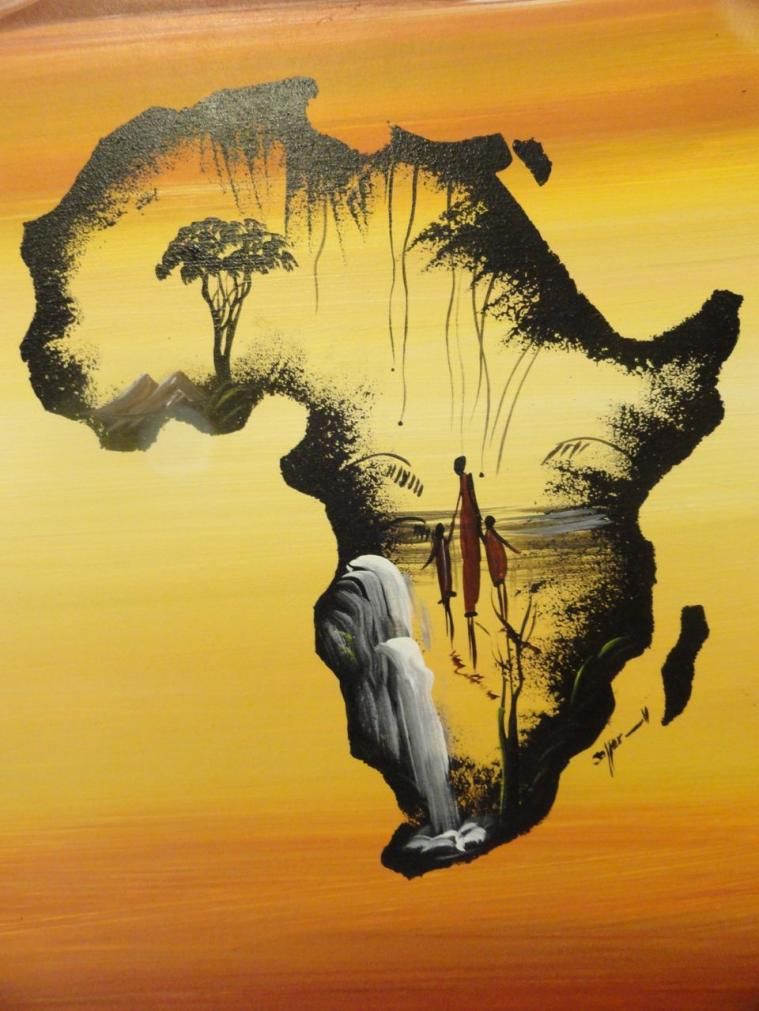
Two countries in West Africa got their names from the Niger River, a principal river in West Africa. These are Niger and Nigeria. According to historical sources, in the specific case of Nigeria, Flora Shaw suggested this name for the territory in a special article published in The Times on January 8, 1897. Flora was a British journalist and the wife of Lord Frederick Lugard, a British colonial governor of Nigeria. Nigeria attained independence from British colonial rule in 1960, but has retained its foreign name up until today.
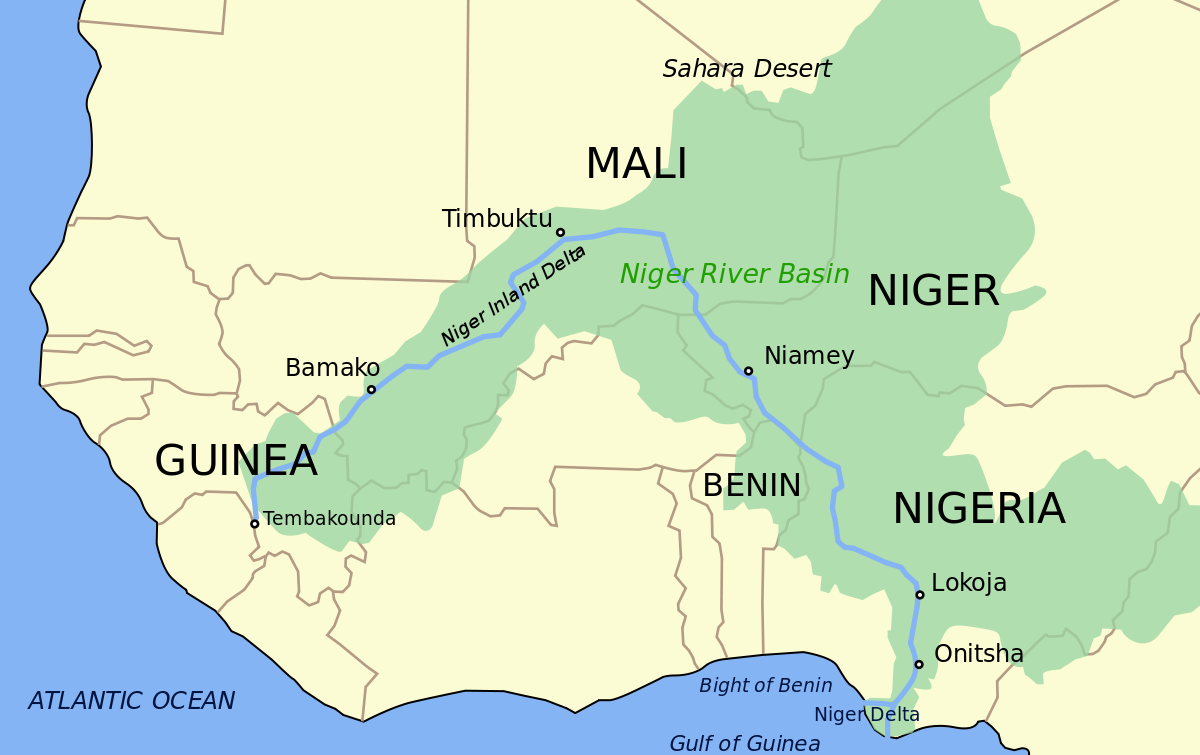
Map of the Niger River, From Wikipedia
History has it that Sierra Leone owes its name to the 15th-century Portuguese explorer Pedro de Sintra. Pedro de Sintra was one of the first European explorers to map out the coast of what is now Liberia and Sierra Leone. It has been told that when Pedro de Sintra was approaching the coast, he and his crew heard lions roaring in the tall mountains rising up on what is now the Freetown Peninsula and he immediately decided to call the mountain range Serra Lyoa (‘Lion Mountain’). This name was modified by English sailors to become Sierra Leone.
Up until 1975, Benin was known as Dahomey. The political boundaries of Benin encompass many ethnic groups including Dahomey. For neutrality on November 30, 1975, the country was renamed the People’s Republic of Benin after the body of water on which the country lies, the Bight of Benin. Benin was also the name of an African kingdom that reached its peak in the 17th century.
Present-day Mali was once called French Sudan. The country derives its name Mali from the Old Mali Empire, one of the three most famous ancient West African empires. The other two empires were Ghana and Songhai.
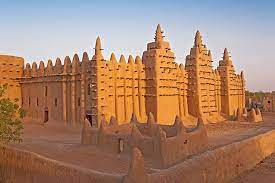
The Ancient Mali Empire,From Africa Archive General
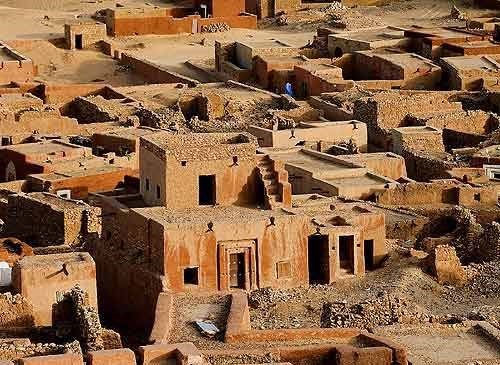
The Ancient Ghana Empire, From Pinterest
Like Mali, Ghana got its name from the Old Ghana Empire. The word Ghana means warrior or war chief, and was the title given to the rulers of kingdom. The name Ghana was adopted at independence in 1957 because it is believed that a number of ethnic groups in the region traced their ancestry to inhabitants of the Ghana Empire. Before independence, Ghana was called the Gold Coast because the Portuguese who came to Ghana in the 15th century found so much gold in the area.
Often called “the jewel of West Africa”, Côte d’Ivoire is the French version of the name Ivory Coast. Côte means coast, and ivoire means ivory. Like the Gold Coast, the name goes back to the pre-colonial times of West Africa when the European traders gave names to coasts according to the prevalent traded product. Portuguese merchants gave this name to the region in the fifteenth century for its abundance of elephants, with their ivory tusks. The country changed its name to Cote d’Ivoire in 1985. Its official name is the République de Côte d'Ivoire, a reflection of French control of the country from 1843 until independence in 1960.
Until 1984, Burkina Faso was called Huate Volta or Upper Volta, a name given by colonizer because the country sits above the Volta River. On August 4, 1984, the country changed its name to Burkina Faso. Burkina means ‘men of integrity’, while Faso means ‘fatherland’. Thus, Burkina Faso is ‘the land of upright people’ or ‘the land of honest people’.
Togo is thought to have been named around the 15th century. The name is believed to have come from two indigenous words – “toh” meaning ‘river’ and “gohdoh” which means ‘on the other side’. The country thus etymologically translates as ‘on the other side of the river’. The said river is thought to be Lake Togo.
Liberia is a country that has had many names. Earlier it was known as the Pepper Coast or Grain Coast or Melegueta Coast because the Portuguese who arrive in the region in the 1500s found the commodity (pepper) in abundance. Beginning in 1820, free slaves were repatriated from America to settle in the area. These freed slaves created the Republic of Liberia in July 1847. The name Liberia is derived from liberty.
Two countries in West Africa bear the name Guinea – Guinea Bissau and Guinea-Conakry. There are two possible narratives on the meaning of Guinea. To some historians it may probably be a corruption of an indigenous Aguinaou meaning “land of the Blacks”. Alternatively, the term may be derived from a corruption of the name Ghana that could also be from Aguinaou. For the Arabs, Ghana meant “land of gold”. The French who colonized Guinea-Conakry named French Guinea (Guinée française) while the Guinea Bissau became a colony of Portugal with the name Portuguese Guinea. When Guinea Bissau declared independence in September 1973, the country included the name of its capital to distinguish it from the other Guinea.
The origin and meaning of the name Senegal may be situated in the country’s geography. Some believe that the country was named after the river of the same name – the Senegal River. The river flows from the south-east and forms Senegal’s northern and eastern borders. During the trans-Saharan trade in the 14th century, the river was known as the “River of Gold.”
Gambia was named after River Gambia. Gambia is derived from the Mandinka language, the largest ethnic group in Gambia. In 1963, the country added a definite article ‘The’ to its name to distinguish it from Zambia, another country in Africa. Since then ‘The Gambia’ has become the official name of the country.
Cape Verde is a country of islands. It has about ten of them. The 15th century Portuguese explorers to the region named it Cabo Verde, which means “green cape.” Later this name was l anglicized to become Cape Verde. However, in 2013, the country changed its English name back to Cabo Verde.
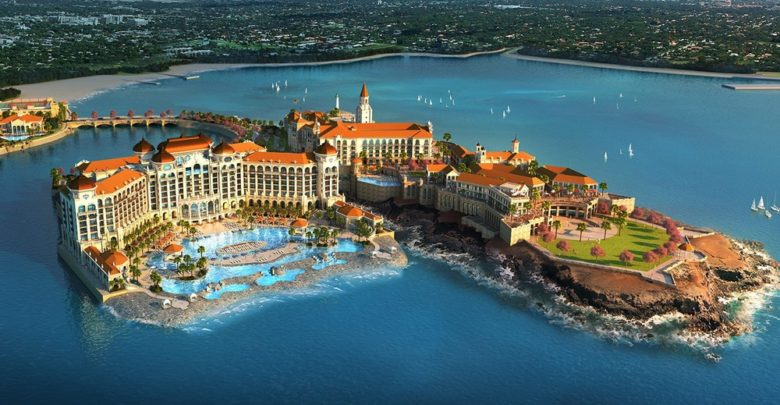
Islands in Cape Verde, From Africa Facts Zone
Mauritania is named after one of the (ethnic) peoples that lived in the region in the ancient times – the Mauri people. The Romans who controlled this area around the 7th century called it Mauritenia, which has been anglicized to become Mauritania.
The remaining West African country is Cameroon. Like many others, the country was named by Portuguese explorers in the 15th century after one of the largest rivers in Cameroon, the Wouri River. These explorers called it Rio dos Camarões which means River of Prawns or Shrimps in Portuguese. The Germans renamed it Kamerun, which today called Cameroon.
Take Away: there are 54 countries in Africa; 16 of these are in West Africa. Despite the unity among them, each country has a unique identity.
Sources:
Hilliard, A. G. (1989). Kemetic (Egyptian) historical revision: Implications for cross-cultural evaluation and research in education. Evaluation Practice, 10(2), 7-23.
Kaifala, J. (2016). Free slaves, Freetown, and the Sierra Leonean civil war. Springer.
Enaholo, P. (January 2014). An exhibit on the British creation and colonization of Nigeria. Available at https://artsandculture.google.com/exhibit/birth-of-the-nigerian-colony-pan-atlantic-university/ARi_MKdz?hl=en